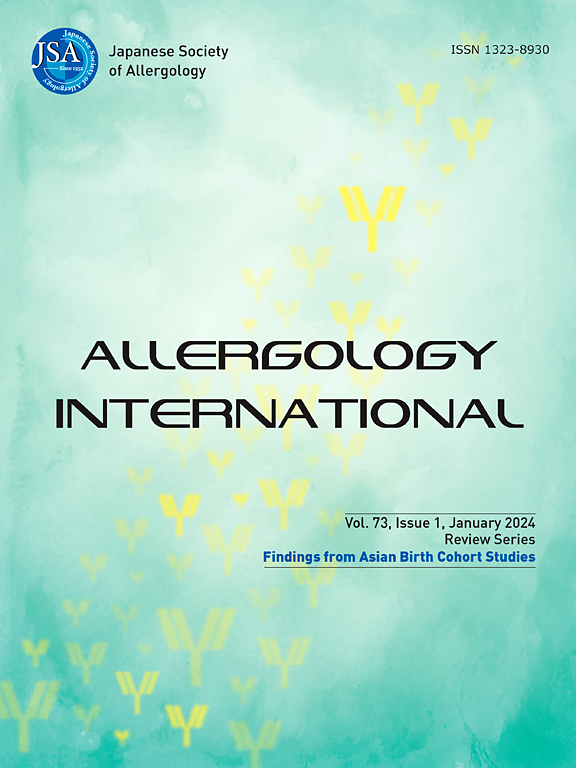T 滤泡调节细胞对 IgE 反应的调节。
IF 6.7
2区 医学
Q1 ALLERGY
引用次数: 0
摘要
过敏原特异性 IgE 是过敏反应的主要介质,在很大程度上导致了人类过敏性疾病。抑制 IgE 生成的疗法将有助于减轻过敏性疾病的负担。大量研究都集中在 IgE 反应是如何被调节的,有几种促进过敏性 IgE 产生的因素已被证实。生殖中心(GC)中表达 IgE 的 B 细胞的发育需要表达 IL-4 的 T 滤泡辅助细胞(TFH)。GC 中的 Ig 体细胞超突变和 B 细胞选择会导致高亲和力过敏原特异性 IgE 的产生,从而引发过敏性休克这种严重的过敏反应。T 滤泡调节(TFR)细胞也存在于 GC 反应中,并与 TFH 细胞一起作用于高亲和力 IgE + B 细胞的选择。本综述探讨了有关 IgE 反应和 TFR 细胞的现有文献。在小鼠研究中,TFR 细胞在过敏性气道疾病的 IgE 反应中起抑制作用,但在食物过敏的 IgE 反应中,TFR 细胞也起辅助作用。在人体研究中,TFR 细胞与过敏反应的减少有关,但目前还缺乏 TFR 细胞对体内 IgE 起直接抑制作用的证据。TFR细胞可能是过敏疗法的一个新靶点,但必须注意促进TFR细胞的抑制活性,而不是TFR细胞对IgE反应的辅助活性。本文章由计算机程序翻译,如有差异,请以英文原文为准。
Regulation of the IgE response by T follicular regulatory cells
Allergen-specific IgE is a major mediator of allergic responses and contributes greatly to allergic disease in the human population. Therapies that inhibit the production of IgE would be useful for lessening the burden of allergic disease. A great deal of research has focused on how IgE responses are regulated, and several factors that promote the production of allergic IgE have been characterized. T follicular helper (TFH) cells expressing IL-4 are required for the development of IgE expressing B cells in the germinal center (GC). Ig somatic hypermutation and B cell selection in the GC leads to the development of high affinity allergen-specific IgE that promotes anaphylaxis, a severe form of allergic response. T follicular regulatory (TFR) cells are also found in the GC response and act with TFH cells in the selection of high affinity IgE + B cells. This review examines the current literature on IgE responses and TFR cells. In mouse studies, TFR cells have a suppressive role on IgE responses in allergic airway disease, however TFR cells also play a helper role in the IgE response in food allergy. In human studies, TFR cells correlate with a decreased allergic response but evidence for a direct suppressive role of TFR cells on IgE in vivo is lacking. TFR cells may represent a new target for allergy therapies, but caution must be exercised to promote the suppressor activity of TFR cells and not the helper activity of TFR cells on IgE responses.
求助全文
通过发布文献求助,成功后即可免费获取论文全文。
去求助
来源期刊

Allergology International
ALLERGY-IMMUNOLOGY
CiteScore
12.60
自引率
5.90%
发文量
96
审稿时长
29 weeks
期刊介绍:
Allergology International is the official journal of the Japanese Society of Allergology and publishes original papers dealing with the etiology, diagnosis and treatment of allergic and related diseases. Papers may include the study of methods of controlling allergic reactions, human and animal models of hypersensitivity and other aspects of basic and applied clinical allergy in its broadest sense.
The Journal aims to encourage the international exchange of results and encourages authors from all countries to submit papers in the following three categories: Original Articles, Review Articles, and Letters to the Editor.
 求助内容:
求助内容: 应助结果提醒方式:
应助结果提醒方式:


